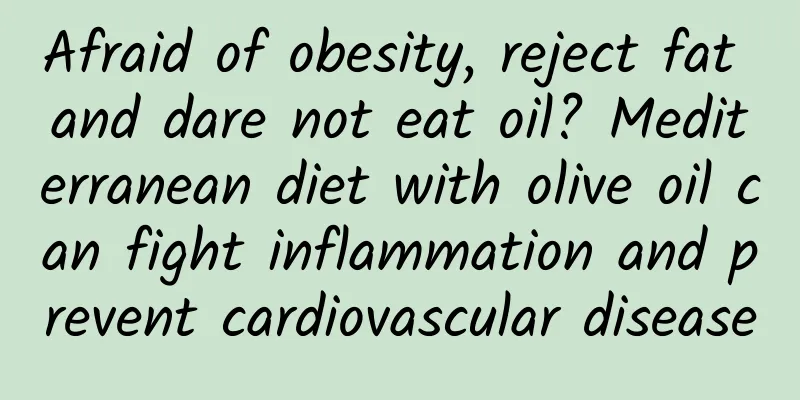Afraid of obesity, reject fat and dare not eat oil? Mediterranean diet with olive oil can fight inflammation and prevent cardiovascular disease

|
For those who are worried about gaining weight, there is often the following seemingly true myth: "Obesity is caused by eating too much oil, so to avoid obesity you need to reduce fat intake." In fact, this statement is only half right. Because eating the right "good oil" will not only not make you fat, but the appropriate amount of "fat" can also help the absorption of vitamin A, vitamin D, vitamin E, and vitamin K. Research and development have found that olive oil, which plays a key role in the healthy "Mediterranean diet", has the benefits of anti-inflammation, prevention of cardiovascular disease, and anti-dementia! By eating good oils, you can get high-quality fats to maintain normal functioning of the body. Is all fat bad? No, there are good fats and bad fats. Likewise, oils and fats are not all bad! In order to maintain good health, we cannot completely refuse fats. We still need to eat some good oils appropriately and take in high-quality fats to maintain the normal functioning of the body. 20% to 30% of the body's total energy comes from fat. When the human body's heat energy intake is greater than its consumption, the excess heat energy is stored in the form of fat under the skin, in the abdomen, around the organs, on the buttocks, etc.; conversely, when the human body's heat energy is less than its consumption, the fat stored in the body will be oxidized and decomposed to provide energy. Therefore, fat plays an important role in the human body. Fat is also one of the main nutrients in the human body. It can help the absorption of vitamin A, vitamin D, vitamin E, and vitamin K, and generate adipose tissue in the human body to take on the responsibility of protecting internal organs. It can also maintain the normal functioning of nerves and skin. There are 4 main components of fats and oils, which are divided into "good fats" and "bad fats" Since fat is indispensable to the human body, how can we take in good fats without having to worry about bad fats accumulating in the body, causing inflammation and leading to a host of problems? According to the American Heart Association, there are four main components of fats we consume daily: saturated fatty acids, trans fatty acids, monounsaturated fatty acids, and polyunsaturated fatty acids, which can be divided into "good oils" and "bad oils" - saturated fatty acids and trans fatty acids are bad oils that will cause bad cholesterol to accumulate in the body's blood vessels, while the other two unsaturated fats are good oils that can help remove bad cholesterol. In order to maintain good health, we cannot completely refuse fats. We still need to eat some good oils appropriately and take in high-quality fats to maintain the normal functioning of the body. Studies have shown that adopting a Mediterranean diet can reduce the incidence of cardiovascular disease, cerebrovascular disease, cancer and other diseases. Some scholars also advocate that the Mediterranean diet can prevent dementia. The Mediterranean diet can reduce cardiovascular disease, and olive oil is the main ingredient Studies have shown that adopting a Mediterranean diet can reduce the incidence of cardiovascular disease, cerebrovascular disease, cancer and other diseases. Some scholars also advocate that the Mediterranean diet can prevent dementia. Olive oil is one of the main ingredients in the Mediterranean diet. It contains a certain proportion of monounsaturated fatty acids, which can help remove bad cholesterol from the body and reduce the risk of cardiovascular disease. 【Four key nutrients in olive oil】 Pan Fuzi, a nutritionist at Beitou Health Management Hospital, said that olive oil is rich in many ingredients that are beneficial to health. For example, olive polyphenols and vitamin E are excellent antioxidants that can fight free radicals. It also contains plant sterols, which will compete with cholesterol in the intestines and reduce the body's absorption of cholesterol. The following are the four key nutrients of olive oil: 1. Olive polyphenols: Olive oil contains more than 30 kinds of rich olive polyphenols, which are excellent antioxidants that can help the human body fight inflammation. 2. Vitamin E: Olive oil contains a high level of α-vitamin E, which has the effect of scavenging free radicals and can protect the body's fat-soluble tissues, such as blood vessels and cell membranes. It can also prevent fat-soluble substances (such as low-density lipoprotein LDL, structured fatty acids) from being oxidized and causing harm to the body. 3. Monounsaturated fatty acids: Olive oil contains monounsaturated fatty acids, which can help increase good cholesterol (HDL), lower bad cholesterol (LDL), and reduce the risk of coronary heart disease. 4. Plant Sterols: The main plant sterol in olive oil is β-sitosterol. Plant sterols are similar to cholesterol in structure. When sufficient plant sterols are supplemented, they will compete with cholesterol in the intestines and reduce the body's absorption of cholesterol. Therefore, they have the effect of lowering blood cholesterol. Olive oil is rich in many ingredients that are beneficial to health. For example, olive polyphenols and vitamin E are excellent antioxidants that can fight free radicals. It also contains plant sterols, which compete with cholesterol in the intestines and reduce the body's absorption of cholesterol. Olive oil can help prevent cardiovascular disease, but it is still not advisable to consume too much Nutritionist Pan Fuzi reminds the public that because Taiwanese people prefer to eat high-fat and high-calorie foods such as stewed meat, braised pork rice, scallion pancakes, and fried chicken, it is easy to consume too much fat without realizing it. In the long run, it will increase blood viscosity and blood lipids will accumulate on the inner wall of blood vessels, causing blockage of the coronary arteries of the heart. Especially in autumn and winter when the temperature is low or the temperature difference is large, there are often reports of people suffering from shock or even death due to acute myocardial infarction. Most people who suffer myocardial infarction are unaware that they have cardiovascular disease and neglect their daily health care. Although studies have shown that olive oil can help prevent cardiovascular disease, it is still not advisable to consume it in excess! According to the oil usage recommendations of the National Health Administration of the Ministry of Health and Welfare: it is encouraged to use more vegetable oils, to "replace" saturated fatty acids with unsaturated fatty acids, to increase the intake of good oils and at the same time reduce the intake of bad oils. The upper limit of daily fat intake is: 70 grams for men and 55 grams for women, and saturated fat should be less than 10% of total calorie intake. [Nutritionist's Tips]: Cardiovascular disease has been called a silent disease. Men over 40 and women over 50 are recommended to undergo regular low-dose computed tomography (LDCT) and coronary artery calcification analysis (CAC) examinations to gain a preliminary understanding of vascular calcification. They can also assess the need for further cardiac vascular imaging (CTA) based on family history of cerebrovascular disease, their own eating habits, and the three high diseases that are easily overlooked with age. By implementing the principle of "early prevention and early detection", cardiovascular health can be maintained. |
Recommend
What are the specific manifestations of the harm of uterine fibroids?
Among gynecological diseases, uterine fibroids ar...
Vitamin D deficiency can lead to obesity, and there are 6 major risks you can’t avoid! Pharmacist Zhao Shunrong: Obese people need high doses of vitamin D
Vitamin D is known as the "sunshine vitamin&...
Experts explain the causes of vaginal candidal infection
Female friends often need to take care of the dai...
What to do if you have lower abdominal pain during menopause? Don’t panic
Menopause is a special period for women. The horm...
Treatment of Dysfunctional Uterine Bleeding Requires Treatment of Both Symptoms and Root Causes
Functional uterine bleeding, referred to as DUB, ...
Is it safe to have sex right after your period? Not safe
The period just after the menstrual period is con...
Revealing the dangers of dysmenorrhea that women should know
During menstruation, some women often experience ...
Still stretching to warm up? Do this before and after exercise to reduce the burden on joints
I believe many people have had this experience: a...
What is the most serious consequence of pelvic inflammatory disease? Eventually secondary infertility
If women do not pay attention to their health, it...
How to eat healthily for menopausal women
It is said that being a woman is the most trouble...
Causes of cervicitis
What causes cervicitis? Cervicitis is now a commo...
Is ultrasound examination necessary for pelvic inflammatory disease? Only for serious cases
Pelvic inflammatory disease can be treated with B...
What to do if you have a miscarriage at seven months? What are the symptoms of miscarriage that may occur in the second trimester?
Women are actually weaker during pregnancy, so th...
Let's learn about the harm of dysmenorrhea
Dysmenorrhea is not unfamiliar to many women, but...
What are the early symptoms of cervical erosion?
Cervical erosion is a gynecological disease that ...









